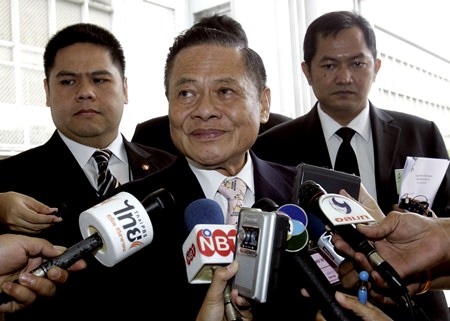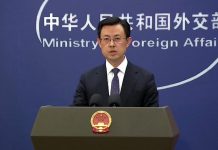Bangkok (AP) – Banharn Silpa-archa, a provincial political powerbroker who served a scandal-ridden 16 months as Thailand’s prime minister in 1995-96, has died at age 83.
His death early Saturday morning was announced by Bangkok’s Siriraj Hospital, where he was admitted Thursday after an asthma attack.
Banharn was considered a master of pork barrel politics, making his home province of Suphanburi, in Thailand’s central rice-growing region, one of the country’s most developed and prosperous-looking. His domination of politics and business there led to it being dubbed “Banharnburi.”
However, his wily political ways played out badly at the national level.
 Former Prime Minister Banharn Silpa-archa has died at age 83. (AP Photo/Sakchai Lalit, File)
Former Prime Minister Banharn Silpa-archa has died at age 83. (AP Photo/Sakchai Lalit, File)
Critics charged that corruption and mismanagement of the economy during his stint as prime minister paved the way for the collapse of Thailand’s currency, sparking the 1997 Asian financial crisis.
Born in Suphanburi to a family of ethnic Chinese traders, he went into the construction business without completing his higher education. Thailand’s building boom of the 1960s – fueled by infrastructure development promoted by the United States as it used Thailand as a rear base during the Vietnam War – made him a millionaire. He joined the conservative Chart Thai Party and was elected to Parliament in 1976, becoming party leader in 1992.
Banharn became prime minister in 1995 by hammering together a coalition with similar regional-based political party leaders keen to share the spoils of power. He also served in a variety of ministerial posts in several governments over four decades.
Banharn, or members of his government, were accused – sometimes unfairly – of accepting bribes for arms contracts and bank licenses, looting a bank of more than $3 billion, appointing incompetent cronies to the Cabinet and state enterprises, firing corruption fighters, politicizing the central bank, engaging in land scams and illegal logging, muzzling the press and blocking political reform.
“Banharn is a great provincial politician,” social critics Sulak Sivaraksa commented during one of the many crises of Banharn’s term in office. “Unfortunately, that’s not what’s needed in a prime minister at this moment.”
The nicknames he acquired reflected his affinity to money politics. He was known as “the walking ATM,” ‘’the eel” – for his party’s ability to slide from one side of the political spectrum to the other – and “Mr. 20 percent,” for allegedly skimming that amount off government contracts in his early career, an allegation he always denied.
Changes in Thailand’s political structure reduced the influence of his medium-sized party, which was dissolved by court order in 2008 for election law violations.
He was banned from politics for five years, but his much-reduced political machine was resurrected in the new Chart Thai Pattana party led by friends and family members. He remained a sort of political elder statesman, generally keeping his distance from the bitter and sometimes violent political battles of the past decade involving supporters and opponents of former Prime Minister Thaksin Shinawatra, an occasional political ally who was deposed by a 2006 military coup.
Banharn is survived by his wife, Khunying Jamsai Silpa-archa, and three children.
A condolence statement issued by the U.S. Embassy in Thailand called Banharn “a longtime supporter of a strong U.S.-Thai friendship.”
“He worked tirelessly to reconcile Thailand’s competing factions, always fighting for his constituents, and sought to better the future of the Thai people,” it said.




